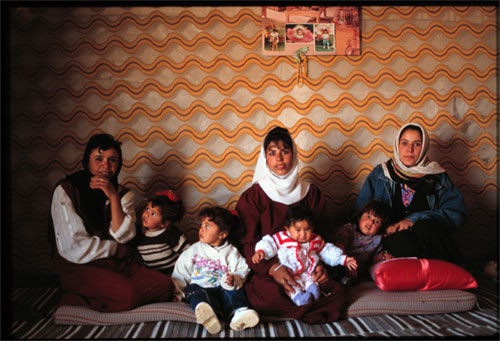
|
 |
|
Bedouin encampment, near the Jerusalem-Jericho road.
Photo: Leena Saraste. |
| Hajj Khalil Bseiss, Bir al-Maskoob, April 12, 1999:
|
|
On a second visit to the 'Jahileen camp' in the spring of 1999, accompanied this time by Leena, Suleiman Mazara'a points out to us two other Israeli settlements on distant hill-tops, Abu Ghnaim and Mizpe Jericho. The Master Plan of Maale Adumim shows that it will eventually spread to these points overlooking Jericho in the east, Bethlehem in the south, and Ramallah in the north. It will then cover an area of 50 square kilometers, effectively cutting the West Bank in half. The displacement of Suleiman's branch of the Jahileen was merely an early step in this process.
Close to the bare slopes of 'camp Jahileen, and in painful contrast, stands a green and forested hill. This was land that Israel confiscated from the villages of Abu Dis soon after the 1967 war, and handed to its own afforestation agency, Karen Keymit. The sheep of the bedouin are not allowed to graze there. Recently Israeli bulldozers have been clearing and flattening lower slopes of the hill on which 'Jahileen camp' stands to receive other evicted bedouin. The designation of the whole of the Jordan Valley as Area 'C' gives them the pretext for such evictions. These are easier to carry out because few bedouin possess documents proving their land rights. Most in any case are 'serial' refugees, originally from the Nagab. In the low flat hills and wadis that stretch out on both sides of the main road connecting Jerusalem and Jericho there are a number of small settlements where bedouin families still eke out a precarious existence. K. takes us to one of them that's close to the road, Bir Maskoob, composed of 35 households. Here we find a few huts and a tent. The mukhtar is absent, consulting with a lawyer, so I record briefly with his brother, Hajj Khalil. Then a woman, Umm |
Sherine, invites us to visit a hut higher up the hill. This flimsy temporary structure is shared between three families. It has no furnishing whatsoever except a few mats. One of the women asks us if we can give them something -- household equipment or money. I ask if we can contribute to a common fund. They say there isn't one. As we leave I look back and see three women, each carrying a child, outlined against the rocky skyline, moving to another of the huts. They look round to wave us goodbye. It's a moment that heightens our awareness of the element of exploitation in journalistic or academic work.
Hajj Khalil speaks: |
 |
| Photo: Leena Saraste. |
[Salim and 'Arabiya Shawamra] [Umm Jamil Hilal] Copyright©2005 |
|